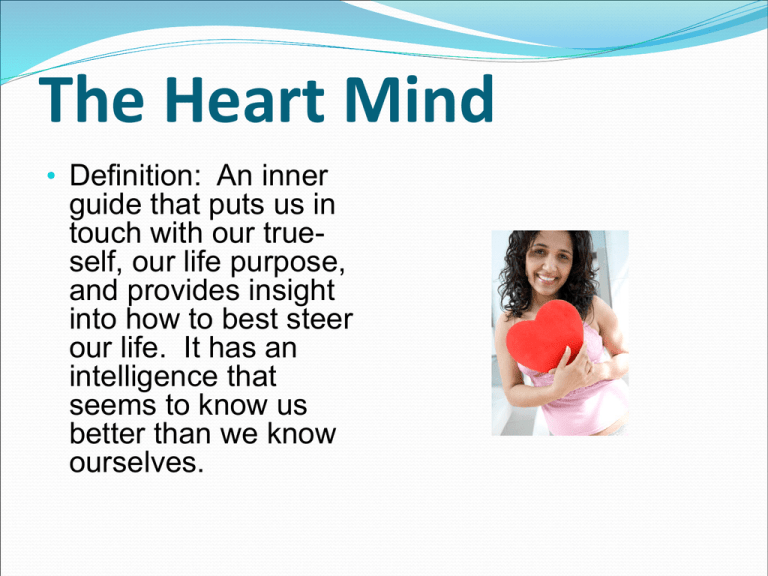
The Heart Mind
• Definition: An inner
guide that puts us in
touch with our trueself, our life purpose,
and provides insight
into how to best steer
our life. It has an
intelligence that
seems to know us
better than we know
ourselves.
Losing Touch with the Heart
Giving our attention to:
- Others approval
- Lying to get people to like
us
- Suppressing our feelings
to get what we want.
Ends in Depression,
Anxiety, wrong choices in
career, friends, and
people we marry.
Getting in Touch with the Heart
Say what you mean
Make decisions that
reflect your values
Performing an inner
ritual often like
meditation, journal
writing, prayer, or
nature.
My experience: Golf –
Pianist – NYL Counseling
We often say, “
It wasn’t in my heart..
What does your heart or
gut say…
I followed my heart…
I knew in my heart…
From the bottom of my
heart…..
In my heart of hearts”
The Heart Feels Things Before the Brain
Actions in the physical Heart precede the actions of
both body and brain……
The Heart perceives something in our environment
and sends a running report to the brain to make a
proper response through neurotransmitters.
Kathy’s Dorm Room
The Self-Image and Ego
The Self-Image
The Ego
The combination of all the
• The selfish part of you.
• Social programming that told us
messages and experiences
that have happened to you
that form the picture of who
you believe you are.
It is the way you think about
yourself.
Elephant 12 foot shuffle
Trick mirrors
we are a separate being apart
from others.
• It will distort reality to get you to
believe you are more
powerful/important than you
think.
• It is fragile and feels it has to
control everything or it will die.
• You can give it sex, food, drink..
and it always wants more.
Differences Between Heart and Ego
Values
Heart Values
Ego Values
Inside oriented
Outside oriented
Seeks truth
Seeks power
Motivation: meaning
Motivation: self-gratification
Decision Maker: Conscience
Approval from others
Learns from bad experience
Crippled by bad experiences
True self
False self
The 3 Minds
1. The Heart/Superconscious Mind
2. The Reasoning/Conscious Mind
3. The Non-reasoning/Subconscious Mind
The Heart/Superconscious Mind
This insightful mind provides creativity, inspiration,
and inner/outer fulfillment through meditation,
dreams, journalizing, prayer, intuition, daydreaming,
etc
People who have overcome deadly addictions
attribute it to letting go of their willpower, conscious
mind and allowing the superconscious mind to take
control. 12 step programs have highest success.
Religions champion the “Heart.” (2 Nuns)
Atheistic doctors say the brain has a spiritual region
that activates with mystical/meditation practice.
The Reasoning/Conscious Mind
This “Captain of the ship” mind directs its thoughts
into action through willpower, discipline, focus, and
reasoning.
Examples of using deliberate thoughts include:
visualization problem-solving, affirmations, and goalsetting.
The Non-reasoning/Subconscious Mind
This habit-mind works without awareness calling
upon previous memories, thoughts, feelings, and
instincts to create positive and/or negative behaviors.
People who sabotage their success, can’t stop their
addictions, and repeat unhealthy habits and behaviors
have an subconscious mind in control of the
personality instead of the conscious mind.
The Gardener Metaphor
The Conscious Mind is the
gardener who plants the
seeds (thoughts) into the
soil which is the
Subconscious Mind.
If you can plant hard work,
commitment, and
visualization into your
subconscious mind or
worry, doubt, and fear to
pursue your college degree.
The Computer Programmer
The Conscious Mind is
the Computer
Programmer who
programs encouraging,
successful, positive
thoughts into the
Subconscious Mind.
The Subconscious Mind
is like the software that
will obey any command
you give it.
How Diverse Philosophies Value the 3 Minds
Subconscious
Mind
Trad. Psychology
X
Conscious Mind
X
Alcohol Anon.
X
Materialist
Hypnosis
Religious-Fund.
New Age
Superconscious
Mind
X
X
X
X
Research Studies on Prayer
Over 150 studies confirm the positive effects of
prayer. They are double blind studies (no placebo).
Heart attack patients who were prayer for left the
hospital sooner with fewer complications.
Fungus that was visualized to stop growing occurred
in 151 out of 194 culture dishes.
Rice in a jar will look like rice 19 days later when
prayed and talked to while rice that was cursed
turned brown and rotted away.
See the research journal references in the book.
Find an Inner Ritual that Works For You
Try Meditation (helped college students attain
significantly higher GPA’s (Hall, 1999).
Prayer
Journal Writing
Time in Nature
Quiet Reflection
Ask yourself, “What part of my life should I spend
more time and energy on?
How should I make it happen?

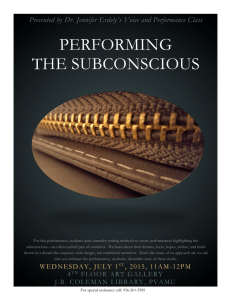
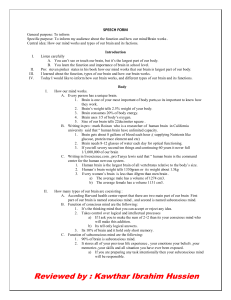
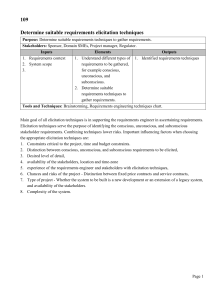
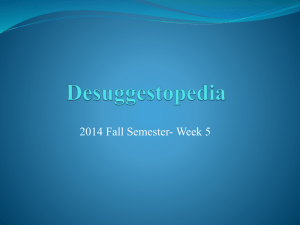

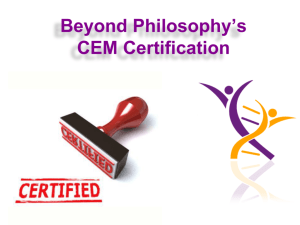
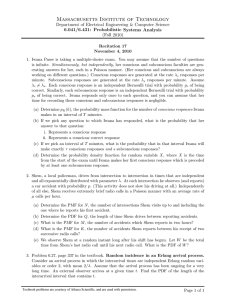
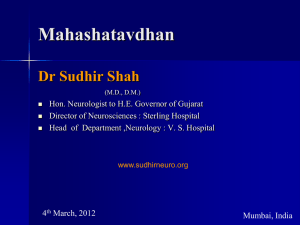
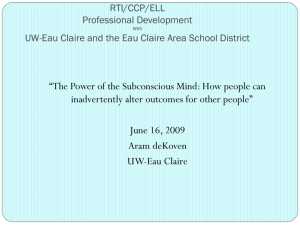
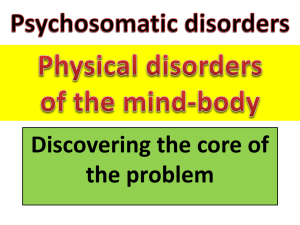

![[ subconscious-and-behavior-modification]](http://s2.studylib.net/store/data/013959549_1-1460ccde2fe92cdc75d24649eeb3cf8f-300x300.png)